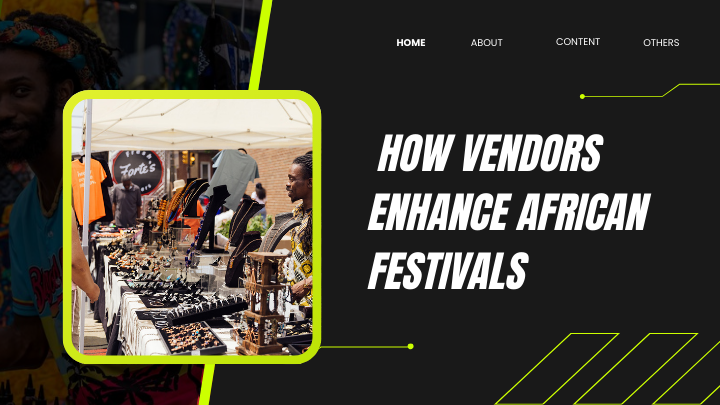How Vendors Enhance African Festivals
African festivals are vibrant celebrations of culture, history, and tradition, and one of the key elements that elevate these events is the presence of diverse vendors. Whether you're attending a festival in Sydney, Melbourne, or Brisbane, vendors are integral to the overall experience, offering attendees the chance to taste authentic African food, purchase unique handcrafted goods, and explore a wide array of cultural products. From food stalls to fashion pop-ups, the contributions of vendors go far beyond just commerce—they create an immersive, sensory-rich environment that brings African culture to life. Let’s take a closer look at how vendors enhance the African festival experience, transforming these celebrations into unforgettable journeys of discovery.
1. Food Stalls: A Taste of Africa’s Rich Culinary Heritage
One of the most anticipated aspects of any African festival is the food. African cuisine is as diverse as the continent itself, with each region offering its own distinct flavors, cooking styles, and ingredients. Vendors who specialize in African food provide festival-goers with the opportunity to experience the vastness of the continent’s culinary landscape.
Variety and Flavor:
From the spicy stews of West Africa to the slow-cooked meats of South Africa, African food vendors showcase an incredible array of dishes. In Sydney’s Africa Day celebration, for example, food stalls serve up dishes such as Nigerian jollof rice, Kenyan nyama choma (grilled meat), and Ghanaian fufu, each with its own unique blend of spices and cooking techniques. In Melbourne’s African Music and Cultural Festival, attendees might enjoy the famous Ethiopian injera (flatbread served with various stews) or a flavorful plate of Moroccan tagine, rich in aromatic spices and slow-cooked meats or vegetables.
Cultural Storytelling:
Many food vendors use their stalls as an opportunity to educate attendees about the cultural significance of the dishes they serve. For example, the vendor serving South African biltong (dried cured meat) might share insights into its origins as a survival food and its importance in South African culinary culture. Through their food, vendors offer a deeper connection to African history, customs, and traditions. The inclusion of such dishes helps attendees experience Africa not only through its music and art but through its culinary expression.
Bringing People Together:
Food has a special way of uniting people, and at African festivals, food vendors create a communal experience that reflects the warmth and hospitality that are central to African culture. Sharing a meal is an important social activity, and food stalls often encourage festival-goers to engage with one another, whether they are savoring dishes together or swapping stories over a plate of steaming, spicy delights.
2. Fashion Pop-Ups: Showcasing African Style and Identity
African fashion has gained international recognition for its vibrant colors, intricate patterns, and innovative designs. Fashion pop-up stalls at African festivals play a huge role in showcasing the creativity and flair of African designers, offering festival-goers a chance to shop for stylish, culturally rich clothing, accessories, and footwear.
Traditional and Contemporary Styles:
Vendors in the fashion section of African festivals present a blend of traditional attire and contemporary African fashion. Visitors can purchase beautifully crafted dashikis, kente cloth garments, or ankara print dresses that reflect the bold and colorful spirit of the continent. Many of these garments feature intricate beadwork, embroidery, and patterns that have deep cultural meaning, often tied to tribal identities or regional styles.
In addition to traditional wear, many pop-up fashion vendors showcase modern African fashion designs that blend contemporary trends with traditional techniques. These styles often incorporate bold, geometric prints, as well as elements like leather, beads, and bright colors, making them perfect for festivalgoers looking to add a touch of African flair to their wardrobe.
Accessories and Jewelry:
Accessories play an important role in African fashion, and vendors at African festivals are the perfect place to find stunning pieces to complement any outfit. From beaded jewelry and metallic bangles to headscarves and hats, fashion vendors provide festival-goers with a variety of accessories that celebrate the creativity and craftsmanship of African artisans. Many of these pieces are handmade, ensuring that each item is one-of-a-kind and carries a deep cultural connection.
Promoting Sustainability and Fair Trade:
A significant number of vendors at African festivals are committed to sustainability and fair trade practices. Many of the fashion items and accessories sold are made from eco-friendly materials or sourced from local artisans in Africa. By purchasing these products, festival-goers not only support ethical fashion practices but also contribute to the empowerment of African communities and artisans.
3. Arts and Crafts: Handcrafted Goods with Cultural Significance
African festivals provide a platform for local and international artisans to showcase their work. Whether it's intricate wood carvings, textile arts, or paintings, these artisan vendors offer festival-goers the chance to purchase meaningful, handcrafted items that celebrate the cultural diversity of Africa.
Traditional Art Forms:
Many of the arts and crafts available at African festivals are deeply rooted in tradition. For example, visitors might find hand-carved wooden masks from West Africa, beaded jewelry from Southern Africa, or batik prints from East Africa. These crafts are not just aesthetically beautiful—they often carry symbolic meaning tied to religious rituals, celebrations, or storytelling traditions.
Supporting Local Artists:
Vendors selling handcrafted goods at African festivals are often local artisans who have honed their craft over years or even decades. These vendors not only offer festival-goers the chance to purchase unique and authentic pieces of African art, but they also provide a livelihood for these skilled creators. By supporting these artisans, attendees help sustain traditional crafts and ensure that these art forms are passed down to future generations.
4. Beauty and Wellness Products: Embracing Natural African Skincare
African beauty and wellness products have become increasingly popular in recent years, and festival vendors play a key role in introducing these products to new audiences. From shea butter and African black soap to baobab oil and argan oil, these natural skincare products are rooted in the traditions of African cultures and are known for their healing and moisturizing properties.
Cultural and Healing Traditions:
Many beauty vendors at African festivals share the cultural significance of the ingredients they use in their products. For example, shea butter, a staple in West African skincare, is often explained as a natural moisturizer and skin protector, used for centuries to treat dry skin, reduce scars, and promote hair health. Baobab oil, derived from the African "tree of life," is often praised for its anti-aging properties and is a common feature in African skincare lines sold at festivals.
Supporting Ethical and Natural Brands:
A number of beauty vendors at African festivals focus on promoting ethical, organic, and sustainable practices. These vendors often prioritize cruelty-free and eco-friendly products, ensuring that festival-goers can enjoy the benefits of African beauty rituals while also supporting brands that care about the environment and the communities they source from.
Vendors are much more than commercial participants at African festivals—they are the lifeblood that makes these celebrations come alive. Through food, fashion, arts, and beauty, they offer festival-goers the chance to engage with African culture in a personal and meaningful way. Whether you're enjoying a flavorful African dish, wearing a beautifully crafted garment, or buying a piece of handmade art, the offerings of these vendors provide an authentic, immersive experience that reflects the spirit of Africa. By supporting these vendors, festival-goers help promote cultural exchange, celebrate African creativity, and contribute to the economic empowerment of African communities and artisans. At African festivals, vendors are not just selling products—they are sharing stories, traditions, and the essence of Africa with the world.



